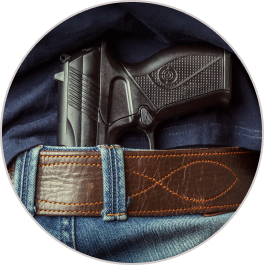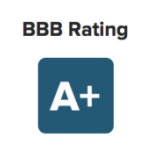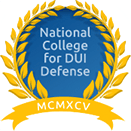Union County Gun Attorneys
The Second Amendment gives you the right to own and use guns, but that right is not unlimited. New Jersey has some of the strictest gun laws in the country, and prosecutors take violations of these laws very seriously. A conviction under New Jersey’s gun laws could cost you your firearms, send you to jail, and lead to fines and other penalties.
If you have been accused of violating New Jersey’s gun laws, The Law Offices of Jonathan F. Marshall can help. Our lawyers have more than 200 years of combined experience, giving us a deep understanding of New Jersey’s criminal laws. Let us put this experience to work on your behalf, protecting your rights and doing everything we can to achieve the best outcome in your case. Contact us today for a free consultation with a Union County gun defense attorney.
What Are the New Jersey Weapon and Gun Carry Laws?
New Jersey has several laws concerning weapons used in crimes and what weapons are legal to carry. The Graves Act and the No Early Release Act are two of the most important.
The Graves Act, found in this section of the New Jersey statutes, imposes mandatory minimum sentences for certain weapons crimes, including using a firearm while committing a crime and illegally possessing certain weapons. Under the Graves Act, those convicted of certain offenses must serve at least half their prison sentence or 42 months, whichever is greater. However, a defendant convicted of a weapons offense that is a fourth-degree crime must only serve a minimum of 18 months.
The No Early Release Act, or NERA, sets minimum sentencing guidelines for certain violent crimes, including several weapons offenses. You can find the text of the No Early Release Act here. In short, the NERA says that offenders convicted of certain first-degree or second-degree crimes must serve at least 85 percent of their sentence before being eligible for parole. Some of the specific offenses listed under NERA include:
- Kidnapping
- Aggravated sexual assault
- Robbery
- Arson
- Burglary
- Firearms trafficking
While the Graves Act and NERA can influence sentencing in a New Jersey gun crime case, there are also state laws defining specific gun-related crimes. These offenses include:
- Possessing certain prohibited guns and other weapons
- Possessing a gun or other weapon for an “unlawful” purpose
- Possessing a weapon illegally, including possessing a handgun without a proper permit
- Possessing a weapon if you have been convicted of certain crimes, such as domestic violence, murder, or sexual assault
- Using a gun while committing certain drug offenses
A Union County, New Jersey, gun defense lawyer can tell you more about these offenses and the potential penalties you might face upon conviction.
Where Are Gun and Weapon Offense Cases Heard in Union County, NJ?
In Union County, cases involving weapons offenses take place at the Union County Superior Court building in Elizabeth. The Law Offices of Jonathan F. Marshall has an office close to the courthouse, so it is easy for us to meet you if you have a court hearing. And as former New Jersey prosecutors, we have a thorough understanding of how weapons cases work and how to help you reach the best possible conclusion to your case. Call us today or visit our contact page for more information.
What Are Common Gun and Weapons Charges in Union County, NJ?
Some of the most common weapons cases a Union County gundefense lawyer works on include the following.
Possessing a Prohibited Gun or Other Weapon
There are a few kinds of guns and other weapons you cannot own in New Jersey, regardless of your criminal history or any other factor. These prohibited weapons include automatic machine guns, explosive devices, and sawed-off shotguns. The law also bans New Jersey residents from owning certain firearms accessories, such as silencers, stun guns, and body armor that can block penetrating bullets.
Possessing a Weapon for an Unlawful Purpose
It is a crime to use a gun to threaten someone or for another illegal purpose. Even if you bought the gun legally and have a permit, you could face charges based on how and why you use it.
Unlawful Possession of a Weapon
Though the U.S. Constitution and state law allow people in New Jersey to own guns, you must meet certain requirements to keep one legally. These requirements include following New Jersey’s rules for handgun permits. Owning a handgun without a permit could lead to a charge of unlawful possession of a weapon.
Certain People Who Cannot Own Guns
To promote public safety, New Jersey lawmakers have banned certain individuals from owning guns or other deadly weapons. This group includes people convicted of domestic violence offenses, those convicted of violent crimes like assault or robbery, and anyone previously convicted of illegally possessing a weapon.
Possessing a Gun While Committing Certain Drug Offenses
Using a gun while committing certain drug crimes can lead to additional penalties. However, these offenses are generally more related to trafficking or distributing drugs than possessing them.
Trafficking in Firearms or Other Weapons
Selling or distributing firearms or other weapons in New Jersey without the proper permits is a major offense. Illegally trafficking in firearms can be charged as a first-degree crime and carries a potential prison sentence of up to 20 years.
What Are Gun and Weapons Possession Penalties in Union County, NJ?
The potential penalties for gun charges in New Jersey vary based on the severity of the offense. Broadly speaking, the penalties for a New Jersey weapons charge are as follows:
First-Degree Crime
First-degree crimes are the most severe offenses under New Jersey law. The potential penalties for a first-degree crime include 10-20 years in prison and steep fines. In many cases, you cannot be eligible for parole after a conviction for a first-degree crime until you have served at least 85 percent of your sentence. In New Jersey, weapons charges that are first-degree crimes include armed robbery, kidnapping, and murder.
Second-Degree Crime
Second-degree crimes carry hefty penalties in New Jersey, though not as steep as the penalties for first-degree crimes. Potential penalties for a second-degree crime include five to 10 years in prison, at least three of which you must serve before being eligible for parole. Second-degree weapons offenses in New Jersey include possessing a handgun illegally and possessing any gun for an unlawful purpose.
Third-Degree Crime
Third-degree crimes in New Jersey carry a penalty of three to five years in prison. Third-degree gun charges in New Jersey include crimes committed using BB guns or airsoft rifles, brandishing a weapon, and crimes committed using non-firearm weapons like brass knuckles or baseball bats.
Fourth-Degree Crime
Fourth-degree crimes are the least severe type of indictable offense in New Jersey, though the potential penalties include up to 18 months in prison. In general, fourth-degree weapons offenses in New Jersey do not involve firearms, though you could face charges for using a stun gun, knife, or another weapon while committing a crime.
What Is a ‘Ghost Gun?’ Is Having One Illegal?
A “ghost gun” is a firearm made by an individual using parts purchased separately, usually from a pre-made kit sold online. Because ghost guns are not made by licensed manufacturers, they are difficult to trace and identify. Many gun control advocates and law enforcement officials argue that ghost guns make mass shootings more likely because there is no way to know when potential shooters are making them in their homes.
Regardless of how you feel about ghost guns, you cannot own one in New Jersey. Gov. Phil Murphy signed a bill banning ghost guns in 2018, and lawmakers added additional provisions to the law in 2019. According to the text of the original bill, violating this law is a third-degree or fourth-degree offense, depending on the facts of the case.
What Can a Union County Gun Defense Lawyer Do for My Case?
If you are facing weapons charges in Union County, a New Jersey gun defense attorney from the Law Offices of Jonathan F. Marshall can help with your case by:
- Explaining the Charges – Weapons charges frequently turn on minute details in a criminal case. Our attorneys can review the charges against you and explain the potential penalties you may face.
- Attending Your Initial Court Appearances – In many New Jersey weapons cases, prosecutors can move to keep defendants in jail while the case is ongoing. Our lawyers can accompany you to your first court appearances and argue to get you released on bail until your case concludes.
- Examining the Evidence Against You – If law enforcement obtained evidence against you through an illegal search, we can ask the courts to throw it out, which could lead to the prosecution dropping their case against you.
- Negotiating a Plea Agreement – Working out a plea deal with the prosecution may be the best move in your case, though our attorneys will evaluate your other options first. If a plea deal seems like the right move, we will do whatever we can to reduce the charges and potential penalties you may face.
- Preparing Your Defense for Trial – Should your case go to trial, our lawyers can prepare a strategy aimed at clearing your name and do our best to keep you out of jail.
Contact a Union County Gun and Weapons Offense Lawyer Today
You have no time to waste if you have been accused of weapons crimes in Union County. Our New Jersey gun attorneys can protect your rights and fight to minimize the potential penalties for your alleged offense. We have an office close to the Union County Superior Court building in Elizabeth, NJ, where weapons charges are heard, and we can meet with you wherever and whenever is most convenient for you.
Call the Law Offices of Jonathan F. Marshall today or visit our contact page for a free consultation.













